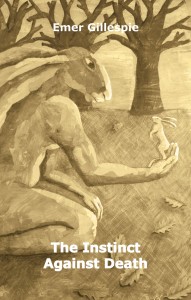Emer Gillespie’s debut collection feels as if it has been gestating for a long time and has slowly unravelled to reveal itself. The end result is a tight collection that beautifully flows from beginning to end.
Gillespie makes a bold decision to begin this collection with an extended sequence, Demeter. I say bold because it’s not an easy place for a reader to start, but Gillespie does it with ease, and directness. It is totally accessible and because of this, striking, and it is fitting to have her presiding over a collection that fosuses on love and death. Demeter loves and loses Persephone: “I thought I heard her call out / but every mother knows that lie, / imagined fears that pierce the heart”. Demeter speaks for every mother, for ours, for Gillespie’s and for Gillespie’s children, poetic or real.
In spite of the range of poems gathered here, Gillespie has the knack of creating a collection that interlocks poems; each one doffs its cap to the one before. Key themes come together. There is recognition of love, its concreteness, its illusiveness and its means of escape. The fluidity of birth to loss spills through the collection. In The Quiet Kind there is the start of love:
“Take you and me. There was the joy of course,
and sleepless nights, but there were decisions,
promises made, like ‘never to divorce’
nor say the kind of words you can’t take back.
Our love’s the quiet kind, no worse for that”.
There is a feeling of measured logic, the head ruling the heart. Yet earlier, in Accident of Birth it is the heart that bleeds, not the head:
“I tried to hold on to you, thought you were
a part of us. There was a photograph
of me in Lisbon, squinting in the sun,
my belly already rounding with the shape of you,
the buttons undone on my everyday clothes”.
The reader knows from the outset that all is not well. “I tried to hold on to you” sets an ominous tone and the reader knows from the lines, “He said at twelve weeks / there was nothing anyone could do” that love doesn’t always play ball, no matter how much the poet wants it to. In The Invisible Eye Gillespie asks us, “Whose loss brings darkness?” and in Tails, she articulates how love itself is intangible and cannot be governed by the individual, “It’s not that love itself has gone away, / it’s more that life keeps getting in the way.” In Equinox she further explores the human condition, “I thought Time’s gaze was elsewhere but / he was here all along, ticking off his hours and days.”
In Me and You she takes it one step further:
“I can’t write a poem
about you,
for where would I start
or stop?
For so long now
we start and stop,
begin and end
in the same place,
I forget
who first chose to sleep where,
who chose the paper
or the car –
the tally is blurred.”
Yet, in these poems there no hint of what Ian Milner calls in his foreword to Miroslav Holub’s collection, (Poems Before and After, Bloodaxe) the “cul-de-sac of nothingness”. Neither Gillespie nor Holub present this in their writing. There is much beauty here, hope and at times resolution. The poet shows us how life is, but also, how life can be. In Words, “When I held them up / to the sun, they sparkled” and in For Elly she reminds us that when spring comes the seeds will “push up towards the sun again and bloom”.
We slide easily into the more humourous side of Gillespie’s world with Eve:
“I wanted to know.
To be honest I’d grown
bored with Paradise,
knew the place
like the back of my hand”.
When we slide out again, we reach stumble across Because, a clever poem that relies on repetition to lead the reader thorough a series of reasons, until at the close it reveals its hand, “because you suspected nothing, you didn’t see the knife”.
The collection ends with a burial, but one that transcends the body and returns to the earth. We end on an encouraging note.
Burial
“Plant me underneath this tree
when you think I am dead.
Don’t bury me standing, or flat in a box.
Instead, place me straight into the ground,
on my side.
I want to become this tree,
feel it become me.
By then I’ll be tired of rushing,
it will do me good to lie still for a while,
wrap myself around the roots,
seep into the sap, enjoy the calm solidity
of its slow beating heart.
When my flesh has gone, fed the earth
I lie in, leaving only bones behind –
I’ll take a branch line to the sun.”
It’s a brave and honest collection that intelligently mixes myth with reality in all its guises. This is a book that lays life bare, lets us pick over its bones and still find the warm heart beating inside. “Let’s part just as we started – with a kiss”.
Emer Gillespie‘s The Instinct Against Death is published by Pindrop Press £8.99. Order your copy here.
Abegail Morley’s first collection, How to Pour Madness into a Teacup was shortlisted for The Forward Prize Best First Collection, her second, Snow Child is published by Pindrop Press. Her chapbook, Eva and George: sketches in pen and brush, is forthcoming. Visit her site: The Poetry Shed: http://abegailmorley.wordpress.com/

